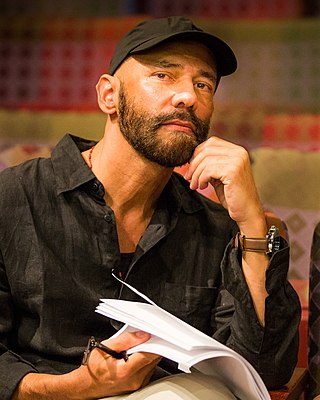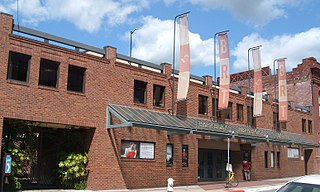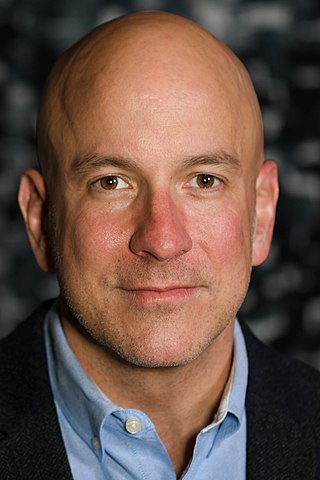See also
- Community theatre
- List of LORT Member Theatres
- Regional Theatre Tony Award
- Broadway theatre - for the other main category of American theatre
A regional theater or resident theater in the United States is a professional or semi-professional theater company that produces its own seasons. The term regional theater most often refers to a professional theater outside New York City. A regional theater may or may not be for profit or unionized. The term "playhouse" is often used to specifically denote this type of theater.
Regional theaters often produce new plays and works that do not necessarily have the commercial appeal required of a Broadway production. Some regional theaters have a loyal and predictable base of audience members, which can give the company latitude to experiment with unknown or "non-commercial" works. In 2003, Time magazine praised regional theaters for their enrichment of the theater culture in the United States. [1] Some regional theaters serve as the "out-of-town tryout" for Broadway-bound shows, and some will accept touring Broadway shows.
Many regional theaters operate at least two stages: a main stage for shows requiring larger sets or cast, and one or more other stages (often studio theaters or black box theaters) for smaller, more experimental productions. In addition to box-office revenue, regional theaters rely on donations from patrons and businesses, season ticket subscriptions, and grants from foundations and government. Some have criticized regional theaters for being conservative in their selection of shows to accommodate the demographics of their subscribers and donors. [2]
Theaters that develop new work, like the Alley Theatre, Long Wharf Theatre, La Jolla Playhouse, McCarter Theatre, and Berkeley Repertory Theatre, often work to move their productions to Broadway venues in New York. They may also educate young audiences through educational outreach programs. [3] Cooperative programs with nearby university theater programs are also common at regional theaters. For example, the Asolo Repertory Theatre is a member of LORT and partners with Florida State University in operating the Florida State University/Asolo Conservatory for Actor Training.
The two major organizations that help to maintain the general welfare of resident theater in the United States are the League of Resident Theatres (LORT) and the Theatre Communications Group (TCG). These organizations encourage communication and good relations between their members and in the community, as well as promoting a larger public interest and support of regional theater.
There are currently 74 LORT theaters located in 29 states and the District of Columbia. [4] LORT acts on behalf of its members in matters pertaining, but not limited to; collective bargaining with unions such as Actors’ Equity Association, United Scenic Artists, and the Stage Directors and Choreographers Society, representation before government agencies on problems of labor relations, and the handling of disputes between members and their employees or union representatives. [5] [6]
The TCG’s mission is similar. TCG’s constituency has grown to encompass more than 700 [7] members throughout the United States. They publish the American Theatre Magazine, the ARTSEARCH online employment bulletin, and dramatic literature. [8]
In recognition of the importance of regional theaters in America, the American Theatre Wing gives a Regional Theatre Tony Award to one regional theater each year during the Tony Awards. This recipient is selected based on a recommendation by the American Theatre Critics Association and receives an award grant of $25,000. [9]
In the second and third decades of the twentieth century, there was a push to get away from the conservative, mainstream ideology of Broadway. [10] The Little Theatre Movement was a precursor of the Regional Theater Movement; it was started by theater artists interested in experimentation and exploring social issues through the dramatic arts. The movement altered the face of the American stage and allowed room for new works and new audiences. [11]
When the first national organization of nonprofit theaters was formed in 1961, there were only 23 regional theaters in the U.S. By 2003, the number of regional theaters had grown to 1,800. [1] As non-profits, they rely heavily on donations from patrons, and some theaters have been accused of "pandering to the audience," subordinating their artistic ideals to the need for donations. [12] Nonetheless, nonprofit theaters are under less pressure than commercial theaters.
The League of Resident Theatres (LORT) is the largest professional theater association of its kind in the United States, with 75 member theaters located in every major market in the U.S., including 29 states and the District of Columbia. LORT members collectively issue more Equity contracts to actors than Broadway and commercial tours combined.

Nilo Cruz is a Cuban-American playwright and pedagogue. With his award of the 2003 Pulitzer Prize for Drama for his play Anna in the Tropics, he became the second Latino so honored, after Nicholas Dante.

Berkeley Repertory Theatre is a regional theater company located in Berkeley, California. It runs seven productions each season from its two stages in Downtown Berkeley.
Eric Coble is an American playwright and screenwriter. He is a member of the Playwrights' Unit of the Cleveland Play House.

Trinity Repertory Company is a non-profit regional theater located at 201 Washington Street in Providence, Rhode Island. The theater is a member of the League of Resident Theatres. Founded in 1963, the theater is "one of the most respected regional theatres in the country". Featuring the last longstanding Resident Acting Company in the U.S., Trinity Rep presents a balance of world premiere, contemporary, and classic works, including an annual production of A Christmas Carol, for an estimated annual audience of 110,000. In its 52-year history, the theater has produced nearly 67 world premieres, mounted national and international tours and, through its MFA program, trained hundreds of new actors and directors. Project Discovery, Trinity Rep's pioneering educational outreach program launched in 1966, annually introduces over 15,000 Rhode Island, Massachusetts, and Connecticut high school students to live theater through matinees as well as in-school residencies and workshops. As of 2016, Trinity Rep's educational programs serve students in around 60% of Rhode Island schools, and it has a 9 million USD annual budget.

Theatre Communications Group (TCG) is a non-profit service organization headquartered in New York City that promotes professional non-profit theatre in the United States.
Bill Rauch is an American theatre director. He was named the inaugural artistic director of the Ronald O. Perelman Performing Arts Center (PACNYC) at the World Trade Center in 2018. The Perelman was the final piece of the plan to revitalize the World Trade Center site and creates work which inspires hope.
Seattle Rep is a major regional theater located in Seattle, Washington, at the Seattle Center. It is a member of Theatre Puget Sound and Theatre Communications Group. Founded in 1963, it is led by Artistic Director Dámaso Rodríguez and Managing Director Jeffrey Herrmann. It received the 1990 Regional Theatre Tony Award.
Jeff Calhoun is an American director, choreographer, producer and dancer.
Portland Stage Company is a professional LORT theater company in the state of Maine. Founded as the Profile Theatre in 1974 as a touring theater company, the company made Portland its permanent location in 1976. In 1982, it moved to its current home of 25A Forest Avenue in Portland, Maine. Anita Stewart has served as the Artistic Director since 1996, and in 2006 was made Executive Director.
Robert Wierzel is an American lighting designer.

Tina Landau is an American playwright and theatre director. Known for her large-scale, musical, and ensemble-driven work, Landau's productions have appeared on Broadway, Off-Broadway, and regionally, most extensively at the Steppenwolf Theatre Company in Chicago where she is an ensemble member.

TheatreWorks Silicon Valley is an American non-profit, professional theatre company based in Palo Alto, California, founded in July, 1970. The company is a member of the League of Resident Theatres (LORT) and employs Equity and non-Equity actors, directors, designers, and specialty artists. The company stages a year-round season of comedies, dramas, and musicals in the Mountain View Center for the Performing Arts and in the California Mission-style Lucie Stern Theatre complex in Palo Alto.

ACT Contemporary Theatre is a regional, non-profit theatre organization in Seattle, in the US state of Washington. Gregory A. Falls (1922–1997) founded ACT in 1965 and served as its first Artistic director; at the time ACT was founded he was also head of the Drama Department at the University of Washington. Falls was identified with the theatrical avant garde of the time, and founded ACT because he saw the Seattle Repertory Theatre as too specifically devoted to classics.

Florida Studio Theatre (FST) is a professional, non-profit theater company located in Sarasota, Florida that represents one of the major cultural institutions in the Gulf Coast region. Founded in 1973 as a touring troupe, FST is currently a regional theatre specializing in contemporary work and a member of the League of Resident Theatres. According to the Theatre Communications Group, it is the third largest subscription theatre in the country. Each year, more than 225,000 attendees are served by the theatre's diverse programs including the Mainstage Series, Cabaret Series, Stage III, Children's Theatre, The FST School, New Play Development, and FST Improv.

David J. Fishelson is an American producer, playwright, and director for film, theatre, television and radio, based in Manhattan since 1982. He is best known for being the lead producer of Golda's Balcony, the longest-running one-woman show in Broadway history (2003–05)—which he also produced as a feature motion picture, Golda's Balcony , that was popular in over 75 film festivals in 2019-20)—as well as being the founder/producer of Manhattan Ensemble Theatre, an award-winning Off-Broadway theatre company located in SoHo, New York City. As a filmmaker, his work has been broadcast on PBS, exhibited theatrically, and selected for 87 international film festivals. As a theatre producer and playwright, his work has garnered 31 nominations from the Tony, Drama Desk, Outer Critics Circle, Obie, Drama League, Lortel, Blackburn Prize and Touring Broadway awards organizations, while landing on Time Out NY's year-end "Best in Theatre" list on 4 different occasions.
M[argaret] Elizabeth (Betty) Osborn,, was a playwright, author, theater director, critic, editor, and educator. From the 1980s to early 1990s, she was a prominent member of the American Theatre Critics Association (ATCA). She worked for the Theater Communications Group (TCG). Osborn grew up in Gainesville, Florida, and graduated from college Phi Beta Kappa.

Lisa Portes is a director, educator, and advocate. She heads of the MFA Directing program at The Theatre School at DePaul University. She serves on the board of the Theatre Communications Group, the Executive Board of the Society of Stage Directors and Choreographers, and is a founding member of the Latinx Theater Commons.

Eric Brent Rosen is an American theater director and playwright.